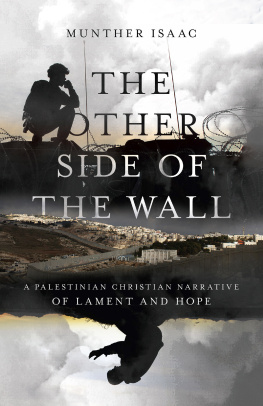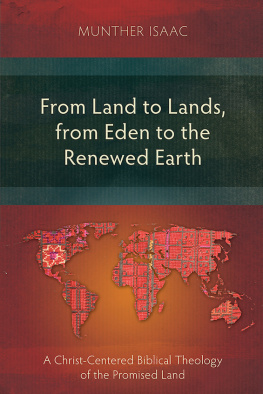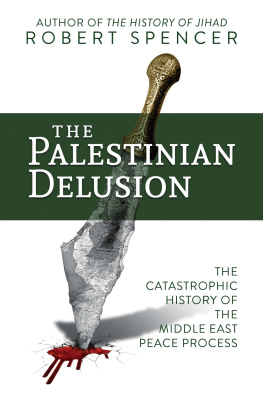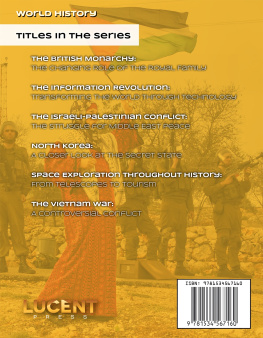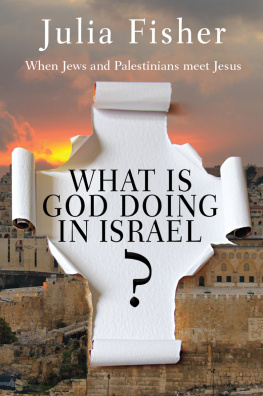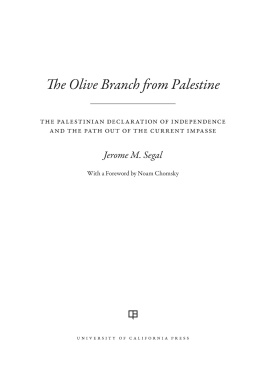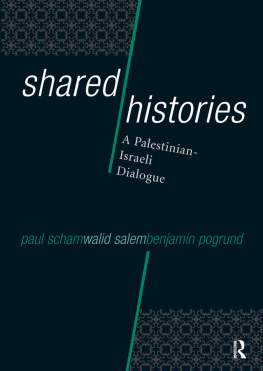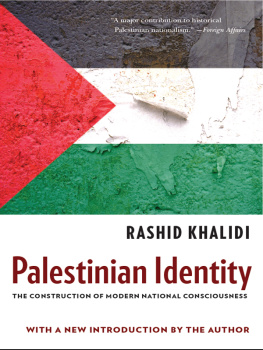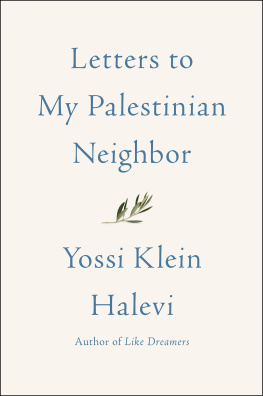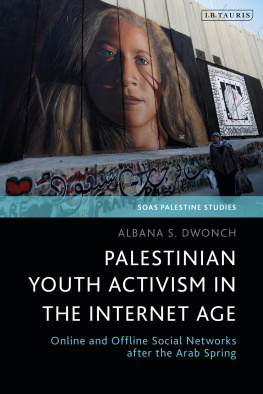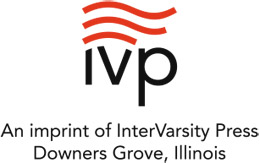Sommaire
Pagination de l'dition papier
Guide
THE
OTHER
SIDE OF
THE WALL
A PALESTINIAN CHRISTIAN NARRATIVE
OF LAMENT AND HOPE
MUNTHER ISAAC
InterVarsity Press
P.O. Box 1400, Downers Grove, IL 60515-1426
ivpress.com
email@ivpress.com
2020 by Munther Isaac
All rights reserved. No part of this book may be reproduced in any form without written permission from InterVarsity Press.
InterVarsity Press is the book-publishing division of InterVarsity Christian Fellowship/USA, a movement of students and faculty active on campus at hundreds of universities, colleges, and schools of nursing in the United States of America, and a member movement of the International Fellowship of Evangelical Students. For information about local and regional activities, visit intervarsity.org.
Scripture quotations, unless otherwise noted, are from the New Revised Standard Version of the Bible, copyright 1989 by the Division of Christian Education of the National Council of the Churches of Christ in the USA. Used by permission. All rights reserved.
While any stories in this book are true, some names and identifying information may have been changed to protect the privacy of individuals.
Cover design and image composite: David Fassett
Interior design: Daniel van Loon
Images: Israeli West Bank wall: Lior Mizrahi / Photodisc / Getty Images
military silhouette: Joel Carillet / E+ / Getty Images
man kneeling at sunset: ImagineGolf / E+ / Getty Images
smoke filled sky: Silvia Bragagnolo / EyeEm / Getty Images
ISBN 978-0-8308-3220-0 (digital)
ISBN 978-0-8308-3199-9 (print)
This digital document has been produced by Nord Compo.
This book is dedicated to all those who
accompanied me along my journey of faith:
To the Baraka Presbyterian Church.
It was there that I began my walk with God.
To the family of the International Fellowship
of Evangelical Students in Palestine, the
Middle East, and the World.
To my professors at Westminster Theological Seminary.
To the family of Bethlehem Bible College: students,
staff, and colleaguespast and present. The college played an important role in making me the leader and theologian I am today. Bishara, Salim, and Yohanna were true mentors, and I am forever grateful for
their investment in me.
To the family of the Oxford Centre for
Mission Studiesa place like no other!
To the family of Kairos Palestine and the global Kairos movementprophetic voices and champions of justice.
To Mitrian inspiring leader, pastor, and theologian,
the one whose sermons and writings helped me
grow in my faith and understanding.
To my colleagues at the Evangelical Lutheran Church
in Jordan and the Holy Land, and to the members
of the Christmas Lutheran Church.
To the talented Jennifer Maidrand, who
worked with me on the manuscript of this book
from the very beginning and assisted me in translating
my thinking into words. I am forever grateful!
To the memory of my father and to my family,
who loved and supported me all the way!
To my two boys, Karam and Zaid, and to
the love of my life and my best friend, Rudaina
who completes me in every way possible.
Above all, this book is dedicated to the
Palestinian people and the Palestinian Churchthe
true champions of this bookand to all marginalized communities who are on the other side
of the wall in their own contexts.
To God be all glory
CHAPTER ONE
AN INVITATION
I t is because you are a Palestinian!
That was the rationale used by the organizers of a major Christian mission conference in Ireland to explain why they were considering withdrawing their invitation for me to speak at their conference. Their concern was not due to any controversial things I had said or done. It was not related to my theological positions. Their hesitancy for me to participate in the conference simply had to do with who I am and where I come from. I was at fault because I am a Palestinian.
Those words have always haunted me. The ideology behind this kind of judgment has been the basis of how many Christians around the world have judged and treated me and my people. In many Christian circles, my being a Palestinian means that I am dismissed as irrelevant, or even an obstacle to Gods plan for the land of my forefathers. If I choose to believe those truths, I must accept that my existence and well-being are secondary in Gods plan. Such beliefs tell me that I do not belong in the land where my forefathers have lived for hundreds, if not thousands, of years because God already decided thousands of years ago who owns this land, and I simply have to accept it!
Being a Palestinian means that I am disqualified from sharing about life in Palestine in many Christian gatherings or even from leading Bible studies in Christian conferences! For many of us Palestinian Christians, these judgments have made us question whether or not God actually loves us as Palestinians. It has caused us to wonder whether God deals with different people in different ways based on their ethnicity, nationality, or religion, or whether we are somehow second-class children of God. Are we at fault because we have the wrong postal address and the wrong DNA?
On the other hand, being a Palestinian means that I am viewed as a demographic threat by the state of Israel and many of its allies. The notion of a demographic threat interprets population increases of particular minorities (usually ethnic) in a certain country as a threat to the dominant ethnic identity of that same country. Palestinians are commonly understood as a demographic threat not only by the Israeli government but by many American politicians and Christian groups as well. Some Christian groups have even offered to pay us Palestinians money to leave the land and settle somewhere else! Paul Liberman, executive director of the Alliance for Israel Advocacy (a lobbying group established by the Messianic Jewish Alliance of America), explains their policy plan as such, If there are any Palestinian residents who wish to leave, we will provide funds for you to leave, with the hopes that over 10 years to change the demography of the West Bank towards an eventual annexation. (And that is supposedly a brother in Christ! With brothers like that, who needs enemies?)
This book is a story of my life journey, with all its struggles and hurdles, in the shadow of these dismissive views and despite thema journey that led me not only to embrace and celebrate my identity but also see it as part of my calling in life. It is about discovering a sense of calling to envision and work for an alternative reality. More importantly, this book illustrates my journey of discovering that the Jesus of Bethlehem, the son of this landin his way and teachings and through the kingdom he established on this earthhas shown us the way for a new and better reality, here and now. This is a reality in which faith can move mountains and prepare the path for a better world.
PALESTINIAN AND ARAB
I am an Arab Palestinian Christian. For many, being a Christian and an Arab (let alone Palestinian) is an oxymoron! Many times in the past, when I introduced myself to a Western Christian, I would get the question When did you convert?assuming that, as an Arab, I must have been Muslim. However, Arab Christianity is not the invention of yesterday. In fact, Arab Christianity predates Islam! The church in the East has a long and very rich history. There were Arab Christians in the very first ecumenical council of churches in Nicaea in 325 CE. In addition, there have been many profound Arab theologians and apologists throughout the centuriesthough one is very unlikely to hear or read about them in Western seminaries and Bible schools.

